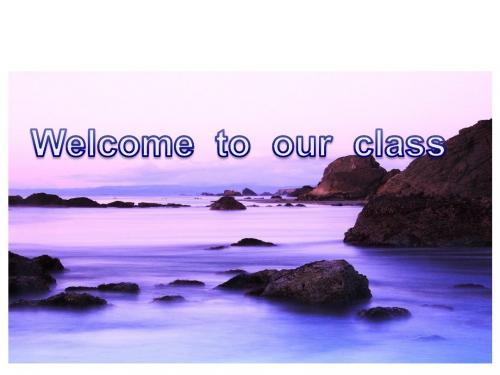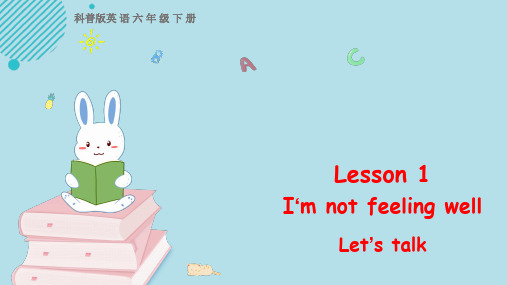(科普版)六年级英语下册课件lesson1
(科普版)六年级英语下册课件_lesson1

New word
New word
First 首先,第一
单词拓展
runner的动词为: run first的反义词: last
farther的原级: far
get down的反义词: get on
1 recite the new words
2 preview the let’s talk
作业
Lucy Mary
Dialogue
Who jumps highest, Tom, Jim or Jack? Jack jumps highest of the three.
JackJim来自TomDialogue
Who is the tallest boy? Tom is tallest of the three boys.
…
重点
strongest 最强壮的 in the world 在世界上 talk with……与…..交谈 In front of 在….前面 believe 相信 Want to …想做…. go out 出去 look for 寻找 On one’s way 在去某地的路上 On his way 在他去的路上
按要求写出下列单词。
Small 比较级 busy 最高级 hot 反义词 heavy 最高级 good 比较级 strong big short slow good 最高级 比较级 反义词 反义词 最高级
Dialogue Lily, Lucy and Mary are running now. Lily Who runs fastest?
Jack
Tom
Jack
Grammar
Who jumps highest? … Who runs fastest? … Who is tallest? …
科普版六年级下册Lesson 1

Read
ANSWER THE QUESTIONS
1.Whose birthday is it today? 2.What’s the weather like today? 3.What is Mary doing now? 4.Is Mary’s mother going to make a cake
你将要举办一个生日聚会吗?
♠ —Are you going to ask Eve to come?
你将要邀请伊芙来吗?
♠ —Yes, I am. / No, I’m not.
是的,我会。 不,我不会。
* Is she going to make a cake? 她将要做一个蛋糕吗? * Are you going to have dinner? 你将要吃晚饭吗? * Are they going to sleep? 他们将要睡觉吗?
Revision
星期三
三十
星期二
星期日
五十 星期四
星期一 二十
Let’s talk
L: What day is it today? 今天星期几?
T: It’s Wednesday.
星期三。
L: My birthday is coming. 我的生日要到了。 T: When is your birthday? 你的生日是什么时候?
♠ 一般疑问句及回答 —Are you going to have a birthday party? —Yes, I am. / No, I’m not.
♠ 现在进行时表将来 My birthday is coming.
♠ Would ... like to表想要做某事 —Would you like to come? —Yes, I’d love/like to. / No, thanks.
六年级英语下册Lesson1《I’mnotfeelingwell》 优秀课件4科普版

10.lie down and rest 躺下来休息
11.hot tea with honey 加蜂蜜的热茶
第五页,共六页。
我们都希望自己能有一个知己,从相逢,相识,到相知,到无话不谈的知己,穷尽一生,朋友广而远,知己少而近,友情文章告诉我们,如果遇到这样一个互相懂得的人,就要好好珍惜。自己是把剑,知己是剑鞘,利剑出鞘,锋芒毕露之时,剑鞘则系在腰间默默守候。一把剑经过一番打打杀杀,江湖缠扯过后,必会五骨通乏,六筋俱困,疲惫充斥于脏腑之间,这个时候, 就需要躺在剑鞘里好好休养了。剑鞘是一把剑最坚实的维修基地,提供最可靠地后勤保障,每当宝剑元气大伤之时,务必要返厂疗伤,作为知己的剑鞘,定是倾其所有,哪怕是砸了老锅,卖了陈铁,也要肝胆相照,以最大功率输出自己的真气,只为保住这把剑。有人腰缠万贯,有人流落街头,有人名扬四海,有人一生庸碌,人这一辈子,旅途虽短,路却难走。注定逃不过 酸甜苦辣,悲欢离合的音速飞镖,注定要吃尽五颜六色的风霜。若能赐一知己,得之是命,惜之是福,可不能随意糟蹋。知己就是半个自己,如果自己是左脑,那知己就是右脑,如果自己是左手,那知己就是右手,如果自己是左边的这瓣心,那知己就必须是右边的另一半。若缺了另一半,就是个死人了,并且还死无全尸,若是挣扎着不死,无异于变异僵尸,理性失效,良 心残废,吞噬人血,不带怜悯,岂不更可怕?人,是个对称的生命,什么都有左右两半,若缺了知己,自己就只剩一半了,不就成了一头怪物了吗?那不就要天天被奥特曼追杀吗?跌倒了,很多人懂得扶你,摔伤了,很多人懂得止血,噎住了,很多人懂得端杯水。可是,当你内心受伤了,即使是小到纳米级的伤痕,有人能看出来吗,你既没感冒,也没发烧,脸色红润,满面 轻风,盖住了内心那瞬间的小小波动,可能不会有任何震感,也许连自己都找不到震源。而这个时候,偏偏有人感觉到地震了,准确侦测出了震级和震源,只有知己才能扫描出你心房里的病毒,唯有知己才会专门为你安装一台精密地动仪。知己能读出你心里最深处的悲伤,埋得再深,填得再厚实,也会被掘出来,而这种近乎奇迹的事只有知己才做得到。人生的轨迹既不是 常数函数式的一马平川,也不会是指数函数式的一路腾达,而是正弦曲线式的跌宕起伏,有升有降,有顶峰,有谷底,盛极必衰,摔倒了最低处,再开始爬升。而知己,就是在我们直线飙升时给我们及时降温,以免过热烧坏了头脑,主机一旦报废了,整台机器随之瘫痪 ;在我们堕落腐朽时给我们添加柴火,用木棒在雪花缤纷的寒冬里,擦出希望的火花,给我们解冻,帮我 们去潮,重新启动。根据牛顿力学定律,力的作用是相互的,人也是这样,知己是自己的知己,那自己就是知己的知己,互为知己,才是真正的知己。若仅有单方面的输出,另一方却浑然不知,只能说明,一方作践自己,另一方没心没肺。一个不会珍惜自己,另一个不会珍惜别人,作为知己的这两半,都没有得到精心照顾,土壤干裂,缺水少肥,杂草丛生,怎么指望这两 半茁壮成长呢,将来不是畸形就是异形,怎么能做知己呢?人心不在大小,而在于单人间和双人间的纠葛,纵使心再大,可就住了你一个人,不觉得空虚寂寞冷吗,就算心再小,可也住下了两个人,那份互为知己的温暖,连上帝都会羡慕的。朋友大薇去北京出差,约了十几年没见的朋友吃饭,大薇在城东,朋友在城西,两个人耽搁在路上的时 间,比见面聊天的时间还长。 匆匆吃饭,匆匆告别,大薇苦笑着说,曾经好得睡一个被窝,说要好一辈子的闺蜜,生生被时间隔在了两岸,再也回不去。每个人都是这样的吧,一路走来,人生的每个阶段,总会有那么几个死党或闺蜜,和你一起疯,一起闹,一起哭,一起笑,在你孤单时给你温暖,在你受伤时给你安慰,在你受欺负时,为你出头……走着走着,在某个人生的转角说了再见,然后就再也 没见到;即使再见,也因为时过境迁,找不到来时的路,无法再走近。就像席慕蓉说的:回顾所来径,只剩苍苍横着的翠微。只有少数人,会陪你一生。坦然面对友情的得到与失去,不必追,不必挽留,这才是人生常态。人生漫长,总有一些人来来去去,总有一些人要离去; 也总有一些人,无论风风雨雨,会陪你一辈子。电影《七月与安生》里的七月与安生,是两个截
最新科普版六年级下册lesson1.ppt

重感冒
一般过去时:表示过去发生的 事情。
规则动词过去式:1.动词后 +ed 2.动词词尾双写+ed
stay(过去式) stayed have (过去式)had get (过去式)got ask (过去式)asked go (过去式)went
stay up熬夜 get up起床 睡着 在晚上
at last最后 怎么了 Have a bad headache严重 头疼 go to see a doctor看医生
空白演示
在此输入您的封面副标题
lesson1
I’m not feeling well
-I我’m现n在ot觉fe得el身in体g 不we舒ll.服。 -W怎ha么t’了s t?he matter? -我Ighi感vaev冒em了ae。csoolmd.eCould you w请a给te我r,p一le些as水e?好吗? -OK.
have a cough 咳嗽 have a fever 发烧 have a headache 头疼 have a toothache 牙疼
1.We’re not feeling well. What’s the matter? We have a cough. Could you give us some water, please? OK.
2. They are not feeling well. What’s the matter? They have a fever. Could you give them some watter, please? OK.
3. He is not feeling well. What’s the matter? He hபைடு நூலகம்s a headache. Could you give him some water, please. OK.
科普版小学六年级英语下 lesson1第一课时

Do you have a cold?
Yes, I think so.
Do you have a toothache? Yes, I think so.
知识点5 叮嘱某人必须做某事的句型 【教材原文】Tom, you must go and see a doctor.
Summary
1. 学习了几个单词wear,coat,pass,和固定的语言结构, give sb something.
2. 学习了几个句型 七彩课堂 句型:询问以及回答伴身你体成健长康状况的句子 —What’s the matter, Tom?—I’m not feeling well, Mom. 句型:询问以及回答某人是否生病的句型 —Do you have a cold? —Yes, I think so.
句式结构 Sb must do something. 注意:must是必须,表示肯定的推测。
知识点6 Here 的用法. 【教材原文】Here you are.
Here it is. 句式结构 Here + 主语 + be动词.
Exercises 一、根据图片或提示完成填空。 1.Daming often_w_e_a_r_s(戴着)a pair of glasses.
拓展辨析 wear,be in,put on, dress的用法区别
wear指穿衣、鞋袜或戴手套等,范围较广,而且侧重穿戴 的状态。 put on 指把衣服、鞋袜、帽子、手套等戴上去,侧重穿戴 的动作。 dress 指给自己或他人穿衣,后加sb,既表动作又可表状态。
科普类六年级下册英语课件

科普类六年级下册英语课件1. Introduction to the Solar SystemThe solar system is made up of the sun and the celestial bodies that orbit around it. It includes eight planets, numerous moons, asteroids, comets, and other objects. In this lesson, we will explore the different components of the solar system.1.1 The SunThe sun is a star located at the center of the solar system. It is incredibly hot and is the source of energy for all life on Earth. The sun’s heat and light is produced by nuclear reactions happening at its core. The sun is so massive that it accounts for 99.86% of the total mass of the solar system.1.2 The PlanetsThere are eight planets in our solar system, listed in order of their distance from the sun: Mercury, Venus, Earth, Mars, Jupiter, Saturn, Uranus, and Neptune. Each planet has its own unique characteristics and features. For example, Earth is the only planet known to have life, while Jupiter is the largest planet in the solar system.1.3 MoonsMoons are natural satellites that orbit around planets. They come in various sizes and shapes. For example, Earth has one moon, while Jupiter has over 70 moons. Moons are fascinating because they can have their own atmosphere and even support liquid water, like Jupiter’s moon Europa.1.4 Asteroids and CometsAsteroids are rocky objects that orbit around the sun. They are smaller than planets but larger than meteoroids. They are often found in the asteroid belt, a region located between the orbits of Mars and Jupiter. Comets, on the other hand, are made up of ice, dust, and rock. They have a tl that forms when they approach the sun and the heat causes the ice to vaporize.2. Exploring Outer SpaceIn this lesson, we will learn about the different ways humans have explored outer space. From the first satellite to manned missions to other planets, we have come a long way in our understanding of the universe.2.1 Early Space ExplorationThe space age began with the launch of the first artificial satellite, Sputnik 1, by the Soviet Union in 1957. This event marked the beginning of the space race between the United States and the Soviet Union. In the following years, both countries sent several manned missions to space, including the famous Apollo Moon landing by the United States in 1969.2.2 Space TelescopesSpace telescopes are telescopes placed in outer space to observe distant celestial objects without the interference of Earth’s atmosphere. They have provided us with breathtaking images and valuable data about the universe. Examples include the Hubble Space Telescope and the Kepler Space Telescope.2.3 Robotic MissionsRobotic missions are unmanned spacecraft sent to explore outer space. They are equipped with instruments and cameras to collect data and transmit it back to Earth. Some famous robotic missions include the Voyager program, which sent spacecraft to explore the outer planets, and the Mars rovers, such as Curiosity and Perseverance.2.4 Future of Space ExplorationThe future of space exploration looks promising. Scientists and engineers are working on new technologies and missions to further our understanding of the universe. For example, there are plans to send humans to Mars, establish a lunar outpost, and search for signs of life on other planets.ConclusionThe solar system is a fascinating subject to explore. From the sun to the planets, moons, asteroids, and comets, there is so much to learn about our cosmic neighborhood. Outer space exploration has also shown us the vastness and beauty of the universe. As we continue to push the boundaries of space exploration, we will undoubtedly uncover more mysteries and make amazing discoveries.Note: Markdown文本格式适用于编写文档,但在展示时需要使用Markdown 渲染工具或将其转换为其他格式。
lesson 1 科普版六年级下册英语

1. 2. 3. 4. 5.
have a fever have a cough have a headache have a toothache have a cold
I'm not feeling well. What's the matter?
I We He have has have a acold. a headache. cough. They have a fever. Could you give me us some him some some water,please? water,please? water,please?
Could you give them some water,please?
Let's learn revision
•Hi,Tom. It's Sam. •There is a football game this afternoon. •Do you want to watch it? •No,thanks. I have a bad cold. •You should drink plenty of water and and stay in bed. I'm in bed now. You can watch the football game on TV. Yes,my father will be with me. That's great! 你好,Tom. 我是Sam。 今天下午有一场足球赛。 want to do sth.想要做某事。 look 是强调看的动作。 得了重感冒 例: look!it is a bird. see 是强调看的结果,强调的看得见看不见。 should 是一个情态动词,与动词原形连用, 你应该和大量的水并且待在床上。 例: i can see a bird. 可以翻译为应该、将会 watch用在看电视看比赛的时候。 我现在正躺在床上 例: let's watch tv together. 大量的水 待在床上
2017春六年级科普版英语下册Lesson01课件

have a fever
发烧
have a headache have a cold
头疼 感冒
have a toothache 牙疼
Thanks.=Thank you.
喂,汤姆。我是山姆。今天下午有一场 足球赛。你想观看吗?
不,谢谢你。我患重感冒了。 哦, 你应当多喝水并躺在床上休息。
是的,我现在就在床上躺着。
你可以在电视上观看这场足球赛。 是的,我父亲将和我一起看。 那太好了!
Read
丹经常熬夜并且起床很晚。 终于他病倒了。 他患严重的头疼,而且在晚 间他睡不着觉。因此他去看 医生。 “哦,你看上去很疲劳。怎 么回事?”医生问道。 “我头疼得厉害,并且晚间 睡不着觉。”丹说。 “你通常什么时间睡觉?” “我通常在12点钟以后上床 睡觉。”
Lesson 01
I’m not feeling well.
Word
Let’s talk M:你怎么了,汤姆?
T:我感觉不舒服,妈妈。
M:你感冒了吗? T:是的,我想是这样。您能给我一些 水吗?
M:给你。
T:谢谢您,妈妈。
M:汤姆,你必须去看医生。 T:好的,妈妈。 M:外面冷,你必须穿上你的大衣。 T:好的,妈妈。您能递给我吗? M:给你。 T:谢谢您,妈妈。 M:告诉我 你的老师的电话号码。我打电话 告诉他 你生病了。 T:好的,给你。
Let’s learn
- I’m not feeling well. - What’s the matter? - I have a cold. Could you give me some water, please? - OK. - We’re not feeling well. - What’s the matter? - We haveme water, please? - OK. - They’re not feeling well. - What’s the matter? - They have a fever. Could you give them some water, please? - OK. - He’s not feeling well. - He has a headache. - OK. - She’s not feeling well. - She has a toothache. - OK. - What’s the matter? Could you give him some water, please? - What’s the matter? Could you give her some water, please?
- 1、下载文档前请自行甄别文档内容的完整性,平台不提供额外的编辑、内容补充、找答案等附加服务。
- 2、"仅部分预览"的文档,不可在线预览部分如存在完整性等问题,可反馈申请退款(可完整预览的文档不适用该条件!)。
- 3、如文档侵犯您的权益,请联系客服反馈,我们会尽快为您处理(人工客服工作时间:9:00-18:30)。
Review …
Tom, Jim or Jack? Jack jumps highestm
Dialogue Lily, Lucy and Mary
are running now. Lily Who runs fastest?
Lucy Mary
Dialogue Who is the tallest boy?
happily more happily most happily
副词比较等级规则
和不规则变化
二、不规则变化
much more
well
better
badly worse
far
farther
most best worst farthest
Read 重点短语
3 in the world 在世界上 4 talk with/ to sb 和某人谈话 5 in front of 在…前面
科普版六年级英语下册课件
Lesson 1
Who runs fastest in your class?
New word runners/'rʌnəz/
in the
of /'mɪdl/
T-
/ʃə:t/
/'ti:,ʃɜ:t/
]
New word
/ɪə/
New word
first /fɜ:st/ 首先,第一
副词比较等级规则
和不规则变化
一、规则变化 1.一般在词尾直接加er或est;
fast faster fastest 2.以不发音的字母e结尾的单词在词尾直接加r 或st;
late later latest 3.以辅音字母+y结尾的词,把y变为i,再加er 或est;
early earlier earliest 4.部分双音节词和多音节词分别在原级前加 more构成比较级和most构成最高级;
He is as tall as his brother.他和他弟弟一样高。 (二)比较级的用法 可以修饰比较级的词,much,a lot,far,…的多a little,a bit,…一点儿 even甚至,still仍然(常见于选择疑问句,及其than前面) e.g.Lesson One is much easier than Lesson Two.第一课比第二课容易得多。
Tom is the tallest of the three boy
Jack
Tom
John
语法
形容词副词比较等级规则和不规则变化及其用法
一 形容词修饰名词,放于修饰的名词之前,且常放于系动词(be动词, 感官动词look)之后;而副词往往修饰动词,放于修饰动词之后。
二 比较等级划分为原级,比较级和最高级 (一)原级的用法 只能修饰原级的词,very,quite,so,too(常见句型as…as) e.g.He is too tired. 他太累了。My brother runs so fast 我弟弟跑得那么快。
in the front of(内部)
6 want to do sth想要做某事
= would like to do sth 7 go out to do sth 外出做某事 8 look for 寻找 look out小心 look at 看着
have a look 看一看look like看起来像 9 on one’s way 在某人的路上 10 meet sb 遇见某人 11 go on 继续;表示某人正在进行 12 climb up 爬上 13 get down 下来
Tom looks even younger than before.汤姆甚至比以前更年轻。 (三)最高级的用法 用于三者或三者以上之间的比较,形容词前面一定加定冠词the,副词前面不 加。 e.g.Tom is the tallest in his class.汤姆是他班上最高的。
Tom runs fastest in his class.汤姆跑得最快在他班上。
shirt.(穿黄色T恤衫的)
• The boy in blue is my brother. • Who is your brother?
• The boy in blue is my brother. • Which boy is your brother?
Let’s learn Who jumps highest,
New word
/ʃaʊt /
Let’s talk
Eve:Look at the three runners.
Who is the one in the middle?(在中间)
MaJun:He’s John. Eve:Is he the tallest boy in your class? MaJun:No, he isn’t. Eve:Who is the tallest boy in your class? MaJun:LinHai. Eve:Who runs fastest in your class? MaJun:LiuWei runs fastest. Eve:Which one is LiuWei? MaJun:Look!The one in the yellow T-
